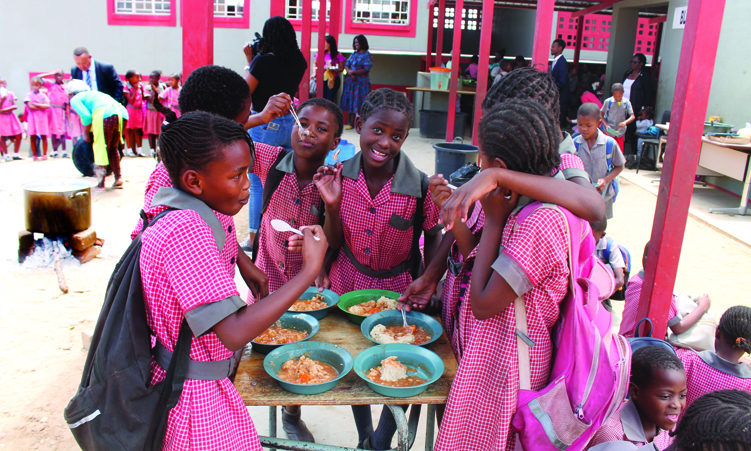More than 15 400 Windhoek pupils have allegedly gone hungry after food supplies to 36 schools have been delayed since January.
Teachers claim the crisis has been so severe that some students have fainted in class.
The Ministry of Education, Arts and Culture insists food will be delivered this month.
Khomas education deputy director Lewin Paulus told The Namibian on Wednesday that the delay in food distribution was caused by the supplier.
“The ministry is aware of the delay of food for the pupils, however, we have made arrangements for the suppliers to start delivering this food from Monday onwards. There were specific reasons at the head office with the contractors and they could not deliver on time due to logistical reasons,” he said.
According to sources who spoke to The Namibian, whenever there is a food delay, the food is usually expired or about to expire, making it unusable.
However, Paulus said that while this issue occurred in the past, it has now been resolved.
“In the past, yes, there were allegations of expired food, but not lately. Systems are now in place to ensure that such things do not happen,” he said.
The school-feeding programme serves more than 400 000 pre-primary and primary school pupils across 1 500 schools to date.
Through this programme, a standardised mid-morning meal is provided, primarily targeting primary school pupils nationwide.
Some teachers have complained about pupils being ill during classes.
“The situation is very bad,” a teacher at Moses //Garoeb Primary School says.
He adds: “When children are hungry, they cannot concentrate and they end up getting sick, and some have even fainted during classes because there is no food.”
According to the teacher, most of the children come from homes where there is no food.
“… and they rely on the school feeding programme. Now the delay is making all of them suffer from hunger,” he says.
Some of the affected schools are Olof Palme Primary School, Moses //Garoëb Primary School, Monte Christo Primary School, People’s Primary School, Havana Primary School, Namutini Primary School, Otjomuise Primary School, Hillside Primary School, Namibia Primary School, Augeikhas Primary School and Fidel Castro Ruz Primary School.
IT WASN’T US
Shimwe Trading Enterprises and Alason Trading are responsible for supplying food to schools.
Shimwe Trading owner Shimwe Bernard, who is responsible for the ingredients, told The Namibian he is unhappy with the ministry’s delay in purchasing orders after he provides the ingredients on time.
“I provided all my ingredients on time. The ministry is the one that purchased the order late. I was never delayed. That is false,” he said.
Alason Trading owner John Bandlow, who is responsible for the blending and packaging, blamed the delay on the ministry.
“The delay came from the ministry. It was never our fault. They are the ones that only placed the order in May, and it has only just now been loaded. They are still not done, we still have all the orders at our warehouse,” he said.
BACK TO EDEN
A case study by the education ministry, conducted in 2012, highlighted the valuable lessons and positive aspects of the Namibian school feeding programme while shedding light on the challenges of implementing the programme.
The report goes further to suggest ways in which the ministry and other stakeholders can improve the implementation of the programme.
“The ministry has a crucial role to play in coordinating efforts to improve the efficiency and effectiveness of the school feeding programme,” the report reads.
“We call upon our development partners and stakeholders to join hands with the ministry of education to address inefficiencies that limit the programme from realising its potential,” it says.
Through the programme, the ministry aims to address inequalities and expand access to educational opportunities to disadvantaged children, particularly orphans and vulnerable pupils.
This week, The Namibian reported that an acute food insecurity analysis projected that a total of 85 000 Namibians are expected to be in phase four in terms of hunger.
Phase four out of five means people are facing extreme food shortages, acute malnutrition and that disease levels are excessively high.
It also means the risk of a hunger-related death is rapidly increasing.
- *This article was produced by The Namibian’s investigative unit. Email us news tips from your secure email: investigations@namibian.com.na
Stay informed with The Namibian – your source for credible journalism. Get in-depth reporting and opinions for
only N$85 a month. Invest in journalism, invest in democracy –
Subscribe Now!










